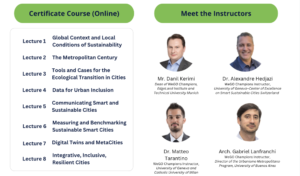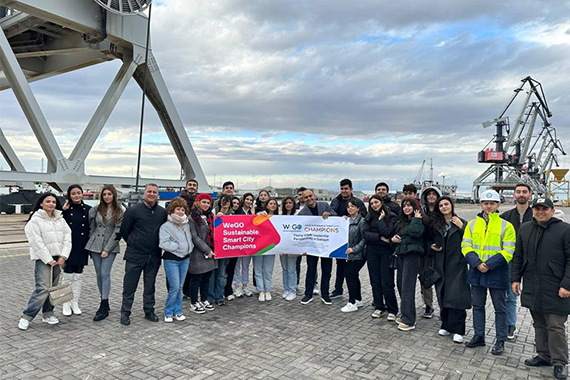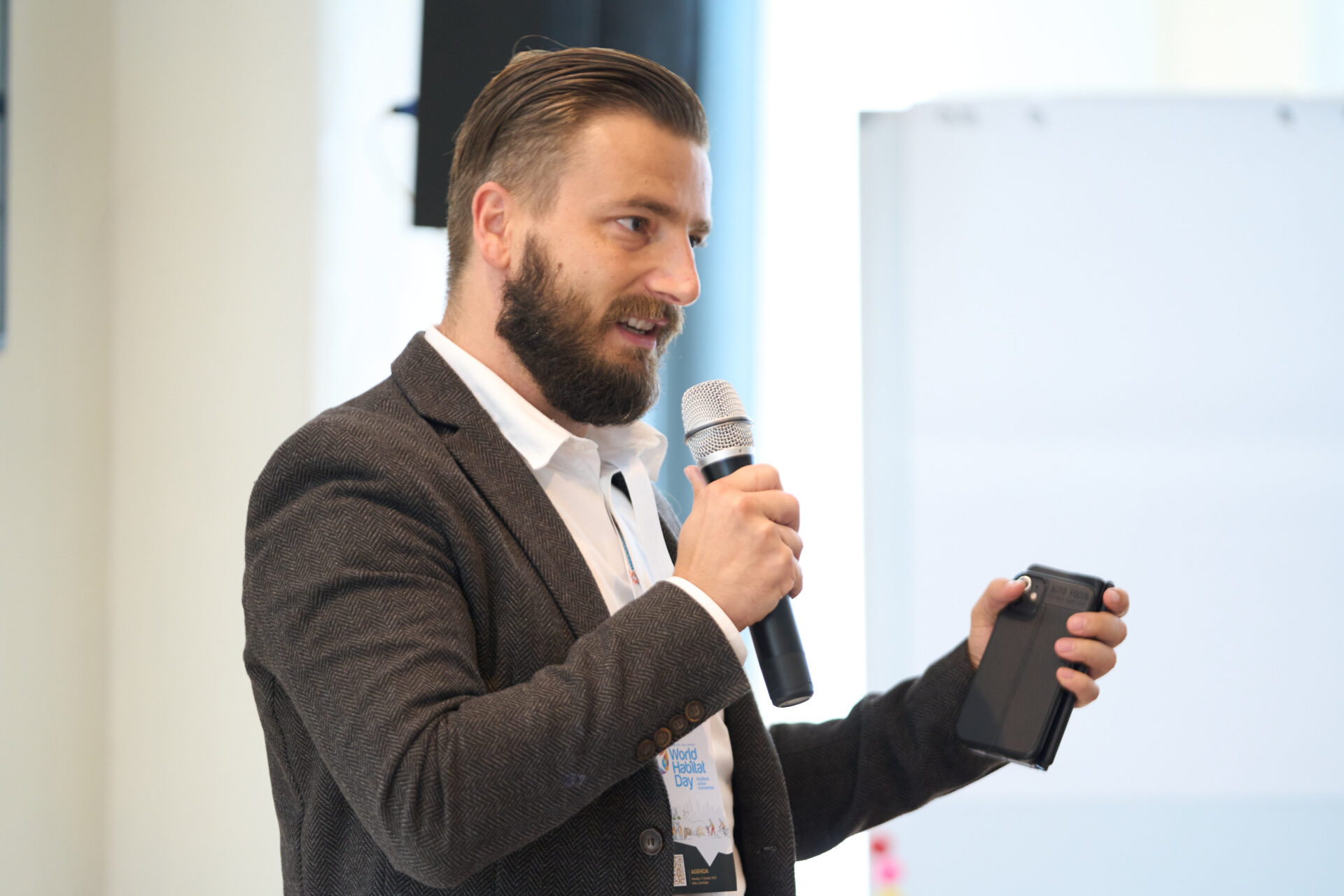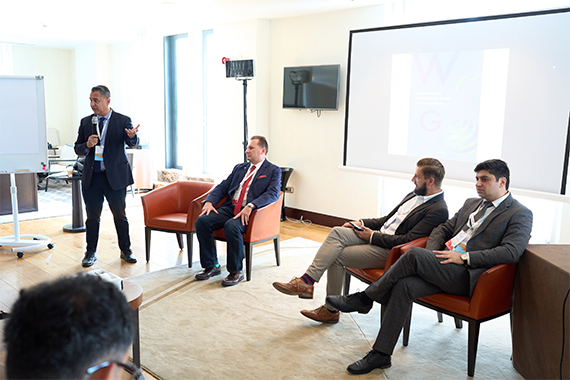WeGO Empowers Young Urban Development Leaders Through WeGO Sustainable Smart City Champions 2023 in Baku, Munich, and Geneva
The World Smart Sustainable Cities Organization (WeGO), a membership-based international association of local governments, smart tech solution providers, and institutions committed to the transformation of cities into smart sustainable cities through facilitating public-private partnerships (PPP), is proud to announce the successful launch of its WeGO Sustainable Smart City Champions this year.
After its successful first run last year, WeGO is expanding the program to a hybrid: the program will be conducted online and in-person. To guide young leaders on centering smart city development back to its citizens, WeGO has published an online course titled “Accelerating, Benchmarking, and Communicating Smart and Sustainable Cities’ Transitions on the online learning website https://www.cityresiliencetraining.com/). The in-person workshops, on the other hand, will be held in five different cities where people-centric smart city transformations are evident.
To facilitate accessibility, flexibility, and adaptability, the WeGO Champions this year has an online course that students can take in their own time. The pre-recorded videos are uploaded on the website, where students can easily sign up to enroll in the course. After each of the eight lectures (running from 25-40 mins each) and suggested readings, passing a short quiz is required to ensure learning and knowledge retention. Completing all will merit the student a certificate from the WeGO Secretariat. So far, the online course will be reaching the participation of 100 WeGO Champions.

The lecturers for the course are esteemed and well-respected academics with a credible reputation in the field of smart city development. Delivering the first lecture (Global Context and Local Conditions of Sustainability) and last (Integrative, Inclusive, Resilient Cities) is Dr. Alexandre Hedjazi, who currently serves as the Director of the Global Environmental Policy Program at the University of Geneva and the UN – Geneva Center for Smart Sustainable Cities.
With 25 years of experience, his specialization on Urban and Regional Development, Urban Sustainability Transition, Nature-Based Solutions, Urban Governance, Public Policy, and Public-Private Partnerships Dr. Hedjazi will surely shed more light to the students on how cities would play a central role in sustainability transitions over the next decade, contributing to addressing challenges. He explains in the lecture that to achieve this, connecting global goals with local conditions through science-based policies is crucial. Moreso, the involvement of the citizens and communities play an important role in the formulation and outcome of people-centric and sustainable projects.
To delve into The Metropolitan Century (Lecture 3) and the Tools and Cases for the Ecological Transition in Cities (Lecture 4), Dr. Gabriel Lanfranchi, brings over 15 years of experience to the course. He is a widely published urban planner, urban economist, and licensed architect, He currently serves as a senior consultant for Swiss cities and international cooperation projects while sharing his expertise as an international lecturer at leading institutions such as MIT and the University of Buenos Aires.
In the lectures, the students will learn from the professor’s comparison of the positive and negative externalities of large and urban agglomerations under the new paradigm of ecological transition. His second lecture will paint a clearer picture of this topic through case studies concerning matrix and hybrid mapping (Greater Geneva), green corridors and superblocks (Barcelona), and the 15-minute city model (Buenos Aires).
The next two lectures on Data for Urban Inclusion and Communicating Smart and Sustainable Cities are given by Dr. Matteo Tarantino. As a professor, his primary focus lies in optimizing the relationship between data, individuals, organizations, and their impact on the world. He is also known for designing and conducting training programs on sustainability assessment for public officials, collaborating with prestigious organizations such as UN Economic Commission for Europe (UNECE), UN Department of Economic and Social Affairs (UNDESA), and UN-HABITAT.
Dr. Tarantino’s first lecture will tackle the complexity of measuring the degree of inclusivity of a city, and will proceed to outlining the three main areas in which innovation in measurement has proceeded: infrastructure, economy, and society and culture. The second lecture deals with the integration of a city’s inclusivity (or sometimes exclusivity) to the city’s branding, drawing from Dr. Tarantino’s extensive study of the field.
An accomplished technology and public relations executive, Dr. Danil Kerimi, is the Dean of the WeGO Champions program. Boasting a proven track record of successfully delivering impactful projects in the realms of national, urban, and corporate digital transformation, as well as emerging technologies, economic strategies, and municipal diplomacy, Dr. Kerimi presents the lectures on Measuring and Benchmarking Sustainable Smart Cities (Lecture 6) and Digital Twins and MetaCities (Lecture 7).
The thesis of the lecture is that comprehensive evaluation of smart and sustainable cities indices is a critical step towards promoting effective urban development. He then zooms in on one of the tools that’s most helpful in the future of cities transitioning to smart cities: the digital twin.
The In-person Workshops
Complementing the online course is the in-person workshops “Young Urban Leadership: Perspectives in Dialogue.” It is a series of lectures and site visits aimed to provide a focused environment for the WeGO Champions to learn and connect with professors and with each other. The dialogue format encourages social interaction and collaboration, and especially boosts the development of creative ideas that could be future solutions initiated by our future leaders.
The offline workshop phase of the WeGO Champions roots from the integral contribution of practical exposure to the learning of its participants. The youth being subject to the many changes in how to go about the world during the pandemic has led us to view that the youth, that these champions, now have the passion, energy, and inspiration to make and further improve the transition of their areas to smart cities.
The workshops are envisioned to be a dynamic exchange of ideas and experiences, seeking to inspire and empower young smart city leaders. Each leg will tackle smart city development concepts and practical applications that are relevant to the specific global city-venues: Baku, Munich, Geneva, Athens, and Milan.
To kick-off the WeGO Champions this year, three of the in-person workshops have been conducted in Baku, Munich, and Geneva, respectively. Three of the professors of the online courses, Dr. Kerimi, Dr. Hedjazi, and Dr. Tarantino moderated the said workshops.
Littoral urbanization Land-use, Waste Management, Global Energy Supply in Baku, Azerbaijan (Oct 1, 2023 and Nov 17, 2023)
The first workshop was held on October 1, 2023 in Baku, the capital city of Azerbaijan. Baku stands as one of the rapidly developing capitals, navigating a transformative trajectory since the conclusion of the USSR era when it assumed the role of the capital for an independent Azerbaijan. Baku has grown to be a modern and vibrant capital attributed to oil and gas revenues, not to mention it being on the route between Europe and Asia. With all the developments in the city and in the country, some geological specificities are compounded by climate change.
This on-site gathering, themed “Littoral urbanization Land-use, Waste Management, Global Energy Supply,” received active participation from more than 30 students hailing from the University of Architecture and Construction (Azərbaycan Memarlıq və İnşaat Universiteti), as well as young professionals and practitioners. The workshop was held in line with the second Azerbaijan National Urban Forum – UN Habitat Day.
Joining our 32 WeGO Champions in discussing how digital and green urban transformation be advanced in a way that supports more inclusive, prosperous, circular, and greener economies are Mr. Haris Piplas from Drees & Sommers and Mr. Tural Aliyev from EAWAG Institute (Federal Institute of Technology Zurich).
Dr. Aliyev covered in his presentation that Baku’s urban development and retrofitting is based primarily on aesthetics and attractiveness with a little consideration of social and environmental aspects. Dr. Piplas’s main message, on the other hand, was pursuing successful connections between architecture and ecosystems in order to boost local micro economies. He further supported this through giving practical examples like the buildings of TU Berlin, Politecnico di Milano, and ETH Zurich.
The whole room had a meaningful discussion on the key components of smart city transformations, especially on public and private sectors, and the young leaders’ role in supporting the advancement of more inclusive and greener economies. Technology adoption, investing in the citizens, and strengthening public-private partnerships were highlighted as ways to fully possess the positive impacts of digitalization.
To further expand the learning of the WeGO Champions, they visited the Port of Baku on November 17, 2023. The port, a major project by the Azerbaijan Government, has been dubbed as the biggest and the busiest port in the Caspian Sea, and is an important transportation hub and link, not only to Azerbaijan, but to the world. The project was initiated to free high value space on the central coastline of the city while reducing industrial risks and pollution due to oil and merchandise transport. The freed space has become a major attraction of the city with quality public spaces, parks and recreation areas: an example of a people-centric development.
The students toured the port, and were given a presentation on the port’s Climate Strategy 2035. Important points discussed include lessening GHG emissions and energy consumption, stakeholder engagement, and promoting the production of renewable energy. Given the history of the port’s service as EurAsia’s hub, it was valuable for the students to gain lessons from the importance of integrated planning, where port activities (importing, exporting) get connected to the continental North-South Rail expansion and connection to Georgia and Russia, hence providing new opportunities of economic growth.
Measuring and Benchmarking Sustainable Smart Cities in Munich, Germany (October 3, 2023)
The second workshop attended by 20 students was held in Munich as part of the Technical University of Munich’s Digitainability Project Week on Sustainable Smart Cities. Munich is well recognized for its Smarter Together sustainability and smart city campaigns and serves as a good example of the cooperation between the academia, the industry, and the government.
The City of Munich’s IT Department (E- and Open-Government and Smart City Division) as represented by Ms. Judith Blumenschein and Ms. Julia König, shared with WeGO Champions how they empowered their city through motivating engagement in citizen science and data donation to push for smart planning and urban research. According to them, encouraging the citizens meant gaining the citizens trust and illustrating the city’s dedication to privacy protection, and showing them individual and mutual benefits of their participation in the city’s growth. Skepticism is also something that the city had to manage through enough information dissemination and engagement with the citizens.
Mobility Data Space (an Acatech/National Academy of Science and Engineering Foundation) was also present in the lecture. Mr. Moritz Stober and Mr. Philippe Langer were present and introduced Acatech as a foundation “providing policymakers and society with independent, evidence-based advice that is in the public interest.” Over 150 organizations are in their network, sharing the same values of creating a culture of data sharing. The goal is to identify Smart City Use Cases that can be realized with their network.
Finally, and as part of WeGO’s Smart Cities Advisory Board, Mr. Danil Kerimi has shared WeGO’s activities and programs focused on smart city transitions research, examining closely on the WeGO Smart City Index. It was the highlight of the dialogue, fueling a dynamic discussion about the different case studies within the paper. There was also a robust conversation on comparing data collections and its methods, setting of smart city key performance indicators (KPIs), and continuing improvement of different city-efforts as a result of WeGO’s in-depth examination of the sustainability benchmarks.
The discussion was moderated by Ms. Helene von Schwichow, a scholar of Social Sustainability in AI and City Contexts. Ms. Helene highlighted that the multifaceted approach is deemed important as it involves the systematic evaluation of key indicators, setting benchmarks against established standards, and implementing targeted initiatives to push for the transition to a smarter, more sustainable urban landscape, as WeGO supports what urban development should be.
Four selected students from the workshop have partnered up to dive deeper into the topic, analyzing similar efforts around the world, examining the underlying data and researching their own cities through the lens of the report. The group was particularly interested in the applicability of global conversation in the local context for their home cities, capabilities of local stakeholders to collect data, and the notative uses of indicators by stakeholders in and outside of the cities examined. They have presented their findings to their peers and invited participants during an event within the school on 13 October.
Localization of Global Urban Sustainability Outlook: Challenges, Opportunities and Skill Needed to Circumvent Urban Sustainability System Complexity in Geneva, Switzerland (October 4, 2023)
The third workshop was held in Geneva, attended by 32 students from the Innovation of Human Development & Sustainability program of the University of Geneva, the WeGO Champions leg in Switzerland focused on tailoring global objectives to the unique characteristics, challenges, and opportunities in the city. Geneva, being a basin of both nature and technological advancement, is ideal for such discussion as the city is home to a lot of international organizations promoting sustainable development. The session was moderated by Dr. Tarantino and Dr. Hedjazi.
Dr. Dimitry Maryasin, the Deputy Executive Secretary of the UNECE (previously the UNDP Resident Representative in Armenia) shared his expertise about the Intergenerational Dialogues of the organization. It is a series of interactive meetings that bridge the perspective of leaders of today and tomorrow, with a focus on UNECE’s work, and how it is a way forward in development. Dr. Dimitry Maryasin encouraged students to take opportunities in addressing smart city transition challenges through continuous engagement and involvement in international organization initiatives like WeGO Champions.
UNECE has also been one of the main global actors in terms of guidelines and standards formulation when it comes to the development field. Dr. Dimitry Maryasin also mentioned the fact that most of the road transportation safety regulation standards (standards that have been formulated since 1947) are the result of UNECE experts, connecting science, policy, and practice. Dr. Hedjazi added that the UNECE Committee on Urban Development, Housing, and Land Management is also an equally central body of analysis and guidelines. They work to promote compact, inclusive, circular, resilient, smart and sustainable cities.
The dynamic discussion between the speakers and the students highlighted how cities are evolving by embracing changes in both ecology and digital technology. The students showed particular interest in the shift in demands of new abilities and knowledge crucial for sustainable development. It was also emphasized that WeGO Champions’ personal experiences as citizens connect with global changes, emphasizing the need to develop skills in assessing and reporting sustainability at a local level. This skill is set to empower upcoming city leaders to evaluate progress and communicate their impact effectively, using consistent measures and benchmarks. It was important to impart to future leaders that the global governance of cities and its action on the ground influences one another, to further complement the local efforts.
The last part of the workshop was dedicated to the role of civil society and grassroot organizations. Dr. Thomas Anderson, former President of Jonkoping University (Sweden) and current chairman of IKED and Water and Humanity NGOS, presented some of the groundbreaking works done by his NGO on empowering civil society to move ahead with the sustainability agenda. The discussion illustrated that besides the academic skill set, organizations with impactful networks and alliances such as WeGO can lead the way through local presence and connections with the most important stakeholders of urban sustainability. Convening the capacity and the exchange of best practices at the cities level, in parallel with the multilateral fora that bring together national governments, ensure that sustainability-driven policy formulation and strategy building is closer to the citizens’ needs and aspirations.
About WeGO
The World Smart Sustainable Cities Organization (WeGO), is a membership-based international association of local governments, smart tech solution providers, and institutions committed to the transformation of cities into smart sustainable cities through facilitating public-private partnerships (PPP). WeGO was founded by 50 member cities in 2010 as the World e-Governments Organization, hence our acronym. In response to the evolving concept of smart cities, WeGO expanded its vision and mandate at the 7th General Assembly (2017) and its name to the World Smart Sustainable Cities Organization. WeGO’s Secretariat is based in Seoul, Korea, and has regional offices in East Asia (Chengdu, China), the Mediterranean (Beyoglu, Turkey), Africa (Abuja, Nigeria), Middle East & North Africa (Abu Dhabi, United Arab Emirates), Latin America (Cuenca, Ecuador), and Central Asia (Almaty, Kazakhstan). As the leading platform on smart city development, WeGO’s mission is to share knowledge and good practices in e-Governance; strengthen administrative efficiency and transparency; advance digital capacity; facilitate civic involvement; bridge the digital divide and inequality; and promote cooperation solidarity among cities and local governments around the world.
WeGO serves for its members as their international platform to improve the quality of life, innovate in the delivery of public services, and strengthen regional competitiveness.
Press Contact:
Name: Kakim Danabayev
E-mail: kakim@we-gov.org
Phone: +82-70-4202-9169






